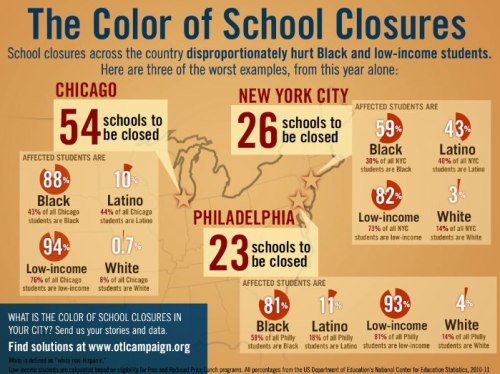 We let our children grow up in communities with high unemployment, low-paying jobs and high crime rates, then when they don’t do well on tests, we declare the school, principal & teachers “failing.” Here in Massachusetts, our “failing” schools are all located in inner-city Boston, Fall River, Holyoke, New Bedford and Springfield – all urban areas, all poor, most heavily minority.
We let our children grow up in communities with high unemployment, low-paying jobs and high crime rates, then when they don’t do well on tests, we declare the school, principal & teachers “failing.” Here in Massachusetts, our “failing” schools are all located in inner-city Boston, Fall River, Holyoke, New Bedford and Springfield – all urban areas, all poor, most heavily minority.
Today’s example: New Bedford’s Parker School:
Since 2010, when the state named Parker a poorly performing Level 4 school, the school has not met the goals established in its turnaround plan, said a spokesman for Education Commissioner Mitchell Chester. “Clearly, since we have not seen progress to date, Commissioner Chester’s expectations for Parker in its third and final year of the turnaround work are high. There will be a sharp focus on seeing a real jump in performance at Parker this year,” spokesman JC Considine said in a statement.
In 2012, Parker’s MCAS scores showed only marginal improvement: 68 percent of students received failing or needs improvement marks in English and 63 percent in math compared to 70 and 65 percent respectively in 2011. The 2013 MCAS scores are expected to be released in September. “We’re kind of in that danger zone,” interim Superintendent Mike Shea said. “They say it’s more than that, but that’s what drives the bus, so if we don’t do well on the MCAS, that’s the big factor.”
If the state designates Parker a Level 5 school, it will appoint a receiver to run the school and report to the commissioner. The partner would be in place likely by mid-year, Considine said. The school will not be given an extension under its current turnaround plan, he added.
What’s happened since Parker was designated Level Four in 2010? The school system is on its third superintendent since then. I don’t have Parker’s individual budget at my fingertips, but here’s New Bedford’s school system budget:
- FY 2010: $111.5 million ($121 million in 2013 dollars)
- FY 2013: $106 million
The budget’s been slashed by an effective 12%. The school system laid off 80 teachers in August 2010. And we wonder why things aren’t turning around?
Sure, administrators & teacher share some of the blame. But not only do teachers have to deal with insufficient prep time, disengaged parents, broken homes, and children who may not even get proper meals outside of school, they’re under constant threat of being declared failures, fired and forced to reapply for their own jobs.
Proponents of reform like to say we can’t keep throwing money at the problem. But in this case, we’re taking money away, then blaming administrators & teachers for not doing more with less. Are we doing what’s right for Massachusetts children, or are officials just pushing the blame down to the lowest levels of power? As eager as politicians are to assign blame for failing schools, ask them to raise taxes & invest in Southcoast’s economy and they run for cover.
As John Tierney reports in this month’s The Atlantic, there’s growing evidence that the push for high-stakes testing and corporate education reform is doing real harm to our children.
Boston contributed to a Broad Foundation guide to closing schools, including how to get regular non-pedigreed folks to shut up, twisting budget numbers to justify your decision, and pretending that choices are driven by student achievement.
The only thing left out is the profit motive. Big Bucks are made in these so-called turnaround efforts.
Starved of resources, with rapidly rotating leadership, these kids have been denied stability and personal relationships in their schools (probably the one safe space in their lives), and Mitchell Chester is too blind, too caught up in his ideology to actually help those poor kids.
Maybe the best, succinct summary of the school “reform” movement I’ve seen is your first sentence: